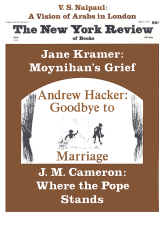In response to:
False Alarm: The Story Behind Salt II from the March 22, 1979 issue
To the Editors:
“Such hard-line professors as Richard Pipes of Harvard suggested that the USSR may well be planning a war, and they argue that its leaders seem confident of winning it.” So soft-line Harvard professor George Kistiakowsky summarizes in the March 22 issue of your paper what he graciously describes as my “nearly” “hysterical assertions.”
In reality, I have neither suggested nor argued anything of the kind. My views, often stated in print and therefore verifiable, can be rendered as follows:
- The Soviet leadership does not desire war, hoping to attain its global objectives without a military confrontation with the United States;
- This same leadership prudently assumes that a war with the United States may, nevertheless, occur;
-
In such a general war, it is their opinion that strategic nuclear weapons will play a decisive role;
-
Proceeding on this premise, they make preparations, both offensive and defensive, to emerge from the calamity with the least possible losses and their political system intact, i.e. “victorious.”
What this means is that the Soviet leadership rejects our dominant view that nuclear weapons have an essentially deterrent function and cannot be rationally employed, in favor of a “war-fighting” and “war-winning” doctrine. This does not mean that they are “planning a war” (except in the sense that any government makes contingency plans for the eventuality of war) or that they are “confident of winning it.” From a scientist one would expect greater care with the evidence.
Nothing that Mr. Kistiakowsky says in his article on SALT has any bearing on the difficult problems confronting our political and strategic planners because of Soviet strategic doctrine and deployments: neither his irrelevant ruminations about the history of ABM, nor his misinformed perception of how the CIA had assessed the Soviet strategic buildup, nor his various obiter dicta, as, for example, on the Backfire bomber. Indeed, his article is not so much a discussion of the pros and cons of SALT II, as an embittered personal attack on those who hold different views from those he happens to profess today.
For Professor Kistiakowsky was not always a soft-liner and enemy of the “military-industrial complex.” In the Russian Civil War he took up arms on the White side against the Bolshevik regime. In the 1940s he played a major role in the development of the atomic bomb dropped on Hiroshima. In 1953, as the member of a select panel established by the Air Force, he urged the US government to develop on a high priority a space rocket fitted with an H-bomb warhead. From 1961 to 1973 he served as Chairman of the Science Board and Director of the Itek Corporation, a firm then overwhelmingly engaged in sophisticated defense work.
Perhaps he now feels remorse about his distinguished contributions to militarism, and needs objects to castigate for what he perceives to be past errors. We remember that during the McCarthy hearings, the most rabid denouncers of Communism, real and imaginary, were ex-Communists. So, too, perhaps with ex-members of the “military-industrial complex.” I do not profess to know. But at the very least I would like my views to be rendered correctly and certain elementary courtesies in argument to be observed. I would also hope for your readers’ sake that some day you will give them a more reasoned defense of SALT II than they can find in Mr. Kistiakowsky’s ill-tempered outburst.
Richard Pipes
Frank B. Baird, Jr. Professor of History
Harvard University
Cambridge, Massachusetts
This Issue
May 3, 1979



